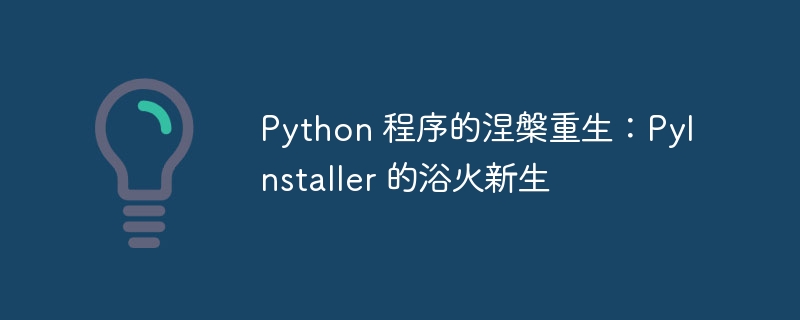
Introduction to PyInstaller
PyInstaller is a tool based on python, used to package Python scripts into cross-platform independent executable files. It does this by compiling Python code into intermediate bytecode and then linking it to an executable file.
Advantages of PyInstaller
Using PyInstaller has the following advantages:
-
Independent executable: The packaged program no longer requires a Python interpreter and can be run independently.
-
Cross-platform support: PyInstaller can generate multiple operating systems suitable for windows, MacOS and linux executable file.
-
Reduce distribution size: PyInstaller will reduce distribution size by packaging all required modules and dependencies into the executable.
-
Improved security: Executable files are more difficult to modify or reverse engineer than Python scripts, thus improving security.
Usage of PyInstaller
To use PyInstaller, you need to install it:
Then, the Python script can be packaged with the following command:
1 | pyinstaller --onefile script.py
|
Copy after login
Copy after login
This command generates an executable file named script.exe (or script for non-Windows systems).
PyInstaller options
PyInstaller provides a number of options to customize the packaging process, including:
- --onefile: Pack all files into one executable file.
- --console: Package a console application.
- --windowed: Package a windowed application.
- --icon:Specify the icon of the executable file.
- --name: Specify the name of the executable file.
Example of PyInstaller
The following example demonstrates how to use PyInstaller to package a simple Python script:
1 2 | # script.py
print("Hello world!")
|
Copy after login
Package the script using the following command:
1 | pyinstaller --onefile script.py
|
Copy after login
Copy after login
This will generate the script.exe executable file containing all required dependencies.
Limitations of PyInstaller
PyInstaller also has some limitations, including:
-
Unable to package some modules: PyInstaller cannot package modules that depend on C extensions or native libraries.
-
Does not support multi-threading: The packaged program does not support multi-threading because it relies on PyInstaller's built-in event loop.
-
Possible increase in distribution size: In some cases, the packaged program may be larger than the original script because of all the dependencies it includes.
in conclusion
PyInstaller is a powerful tool that can be used to package Python programs into standalone executable files. It provides a range of options to customize the packaging process, but it also has its limitations. By understanding its strengths and limitations, developers can effectively utilize PyInstaller to distribute and deploy their Python programs.
The above is the detailed content of The rebirth of Python programs: the rebirth of PyInstaller. For more information, please follow other related articles on the PHP Chinese website!






